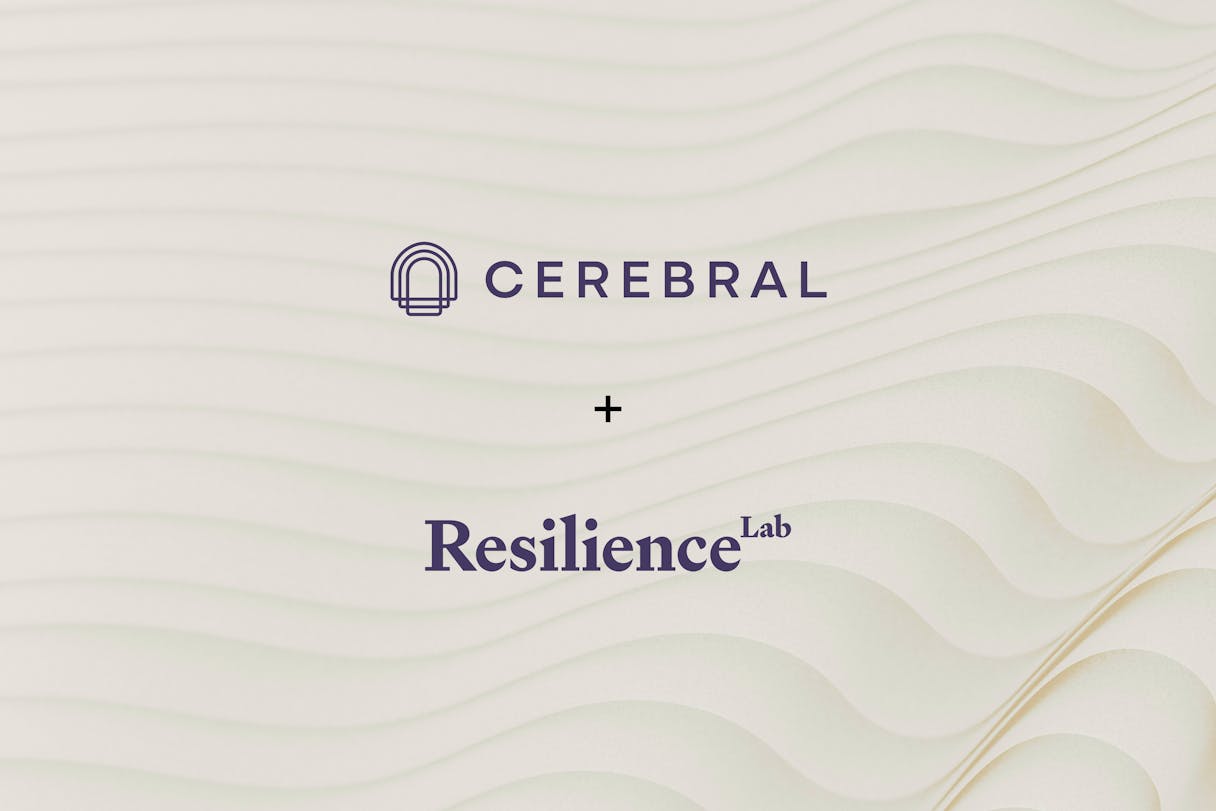CMO Dr. David Mou On Cerebral’s Vision For Comprehensive Mental Health Care
Health Tech Nerds, an online publication about improving healthcare, recently talked to Dr. David Mou, Cerebral’s Chief Medical Officer, about the current mental health crisis and the company’s model to help address it. The hour-long conversation touched on several topics. Here are the main highlights:
Several types of care (3:50)
Clinical quality is our highest priority. One way we focus on improving quality is through the delineation and specialization of care. Cerebral uses a Collaborative Care model, which uses therapists, coaches, care counselors, and clinicians. This allows our highly-trained clinicians to practice at the top of their licenses and spend as much time as possible helping patients, as opposed to spending time on administrative work, such as scheduling appointments and answering billing questions. It also allows us to offer care 24/7. Recent press confused why we do this, but it comes down to delivering the care by the right person.
Managing patient safety (6:38)
Cerebral has a dedicated clinical safety department and a clinical quality department, both run by psychiatrists and staffed by large teams. So, for example, if someone answers a survey and indicates they are suicidal, we immediately give them resources, such as the suicide hotline number, and flag them as a high-risk patient so we can closely monitor their progress. Even further, if this patient does end up in the emergency room or hospitalized, we ensure we’re connected along that path, such as sharing medication information, and scheduling follow-up appointments after discharge. Cerebral doesn’t bill more for this type of care, but we do pay our clinicians more for it.
Improving care coordination (10:32)
The current mental health care system is fragmented, resulting in poor quality. Cerebral coordinates care through several mechanisms, including:
- A proprietary EMR, allows clinicians to access and share important information
- Clinical huddles, which gathers clinicians to discuss and learn from unique cases
- High-risk, high touch care model that proactively looks at solutions for particularly challenging cases
A supportive, hybrid staffing model (17:16)
Cerebral employs both full-time and contract staff. One major reason for this is so we’re able to offer care to as many people that need it. For example, if there is a large surge in care demand, we’re able to meet it by using our large network of high-quality providers, whether they are contract or full-time employees. Quality and access are closely linked, and this is one way we’re able to deliver both.
Many clinicians that join Cerebral are referred in by another Cerebral clinician. And many of them stay because of the support system we’ve built internally, in which they are able to focus more on patient care and support each other through clinical huddles, office hours, training, and group problem-solving. For example, clinicians are able to get in touch with peers within 20 minutes and discuss and find solutions to complex cases via our Curbside Consult line. This creates a supportive environment that fosters learning and ensures clinicians don’t feel alone. We’re also focused on making the work of a clinician easier, such as streamlining EMR notes.
The right, safe treatment (29:34)
We offer treatment for a range of mental health concerns, including depression, anxiety, PTSD, and what are considered more serious conditions, such as bipolar disorder. And different types, including coaching, therapy, and medication management. This, along with our high-quality providers that take controlled substances very seriously, allows us to fully understand what might be the underlying cause of a patient’s concern and treat it with the right plan, even if that is not what the patient initially expected.
For example, a small single-digit percent of patients who report anxiety symptoms are prescribed a controlled substance such as Ativan or Xanax. Another example: Only a single-digit percentage of patients receive a controlled substance for ADHD. So we’re judicious when it comes to prescriptions, and also have safety mechanisms in place, such as clinicians are required to check the state’s databases that show prescriptions patients have previously received, we use regular surveys that check on substance use disorders, and clinicians are able to order urine screens for patients they believe might be at risk of abuse.
Patient journey (37:38)
What’s it like being a patient? Everyone is unique, but in general, you’ll start by choosing the type of treatment you’d like, whether it’s medication, therapy, a combination of both, or coaching. You’ll then answer several different survey questions based on your symptoms. This allows us to personalize your care and match you with a clinician that best matches your needs.
For example, if you’d like someone to help you who is a female African American and has experience in trauma-informed care, we’re able to pair you with someone who can help you with that. This is partly due to our diverse range of clinicians, of which about 49 percent identify as non-white.
After that, you’ll have your first virtual appointment within three days. The clinician will already have the data you provided from your survey, and will also do a medical history check, as well as other types of screens depending on the situation. Typically, how long the appointment is will depend on the type of symptom. For example, conventional intakes are half an hour, but for our opiate use disorder, they are one hour.
If medication is deemed necessary, clinicians will check prescription monitoring programs and assess if there are any comorbidities. We encourage clinicians, particularly in complex cases, to not rush diagnosis and schedule additional meetings, rather than writing prescriptions, especially in complex cases. Unlike many mental health models, we are about getting the right diagnosis and treatment plan so the patient gets better results – not how many patients we can see.
Moving to value-based care (44:16)
Clinician quality is truly Cerebral’s business model, and value-based care is the future. One way we’re working toward this is by working with insurance companies – we have close to 100 million lives under coverage currently – and providing them with data that shows in real numbers how patients are doing. For example, data showing how quickly they are getting care, how engaged they are in surveys, and medication information. We can also match data that’s specific to HEDIS measures that are important to payers. No other provider does this.
Transitioning to value-based care truly allows us to become the comprehensive mental health treatment center for patients, regardless of the margins and risk. It’s also what’s needed if we are going to solve the huge mental health crisis we face.
The future must be measured (50:03)
Measuring outcomes is critical to better outcomes. The vast majority of providers either do not measure at all or if they do, they only use a single clinically validated survey, such as the PHQ-9 for depression. They also might only be measuring a single symptom. Cerebral aims to fix this by being a pioneer in measurement.
One way we’re doing this is by being the first to start gathering data, figuring out the objective measurable outcomes for each condition, and ensuring it’s easy to measure and is meaningful to all parties involved. We plan to do this by working with academics, regulators, non-profits, physicians, other similar businesses, and many other stakeholders to create centers of excellence for conditions. Then look at these metrics, share them, and hope others adopt them.
Continuous improvement (58:08)
We’re in uncharted territory, and we’ve learned that we have to be humble and keep learning and improving along the way. For example, we’ve made changes to our marketing strategies and looking at ways to revamp our internal culture. Health care is very difficult and we continue to take feedback and iterate and improve, because in the end it’s not about us, it’s about improving behavioral health for everyone. And we think we can make it happen.
Listen to the full podcast on Health Tech Nerds.

Our Care: The Resilience Methodology

A New Era of Mental Healthcare: How Cerebral Is Expanding High-Quality, Personalized Care

Cerebral Partners with San Antonio Spurs

Call 911 if you’re having a
mental health emergency
Text Home to 741-741 if you're in emotional
distress and need immediate support
Call or text 988 Suicide &
Crisis Lifeline. Chat service
is available at 988lifeline.org.